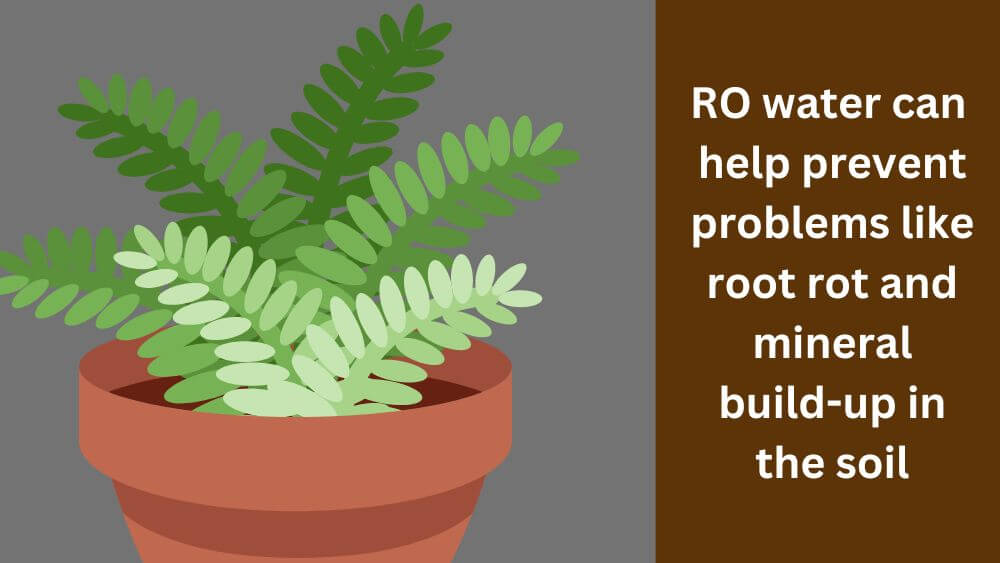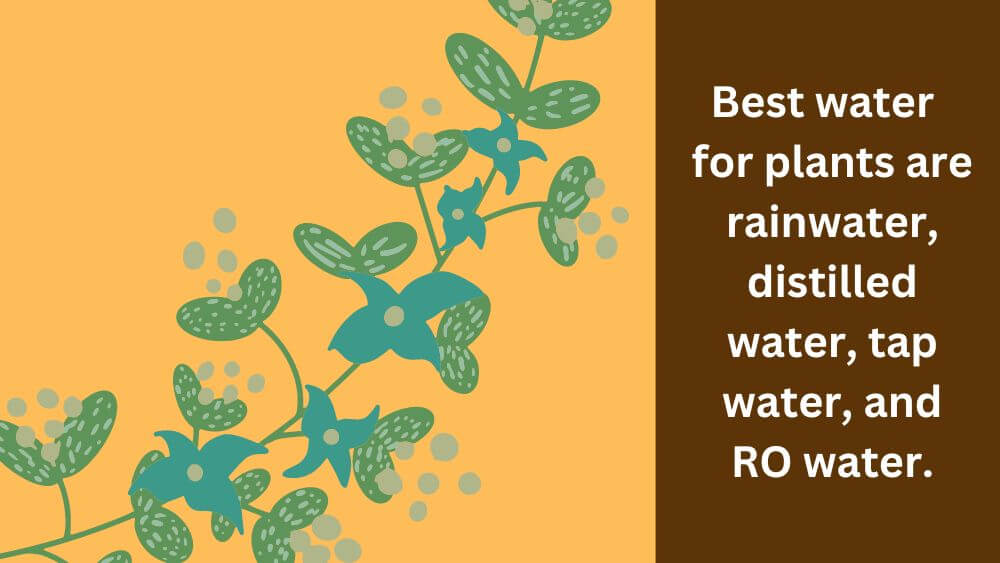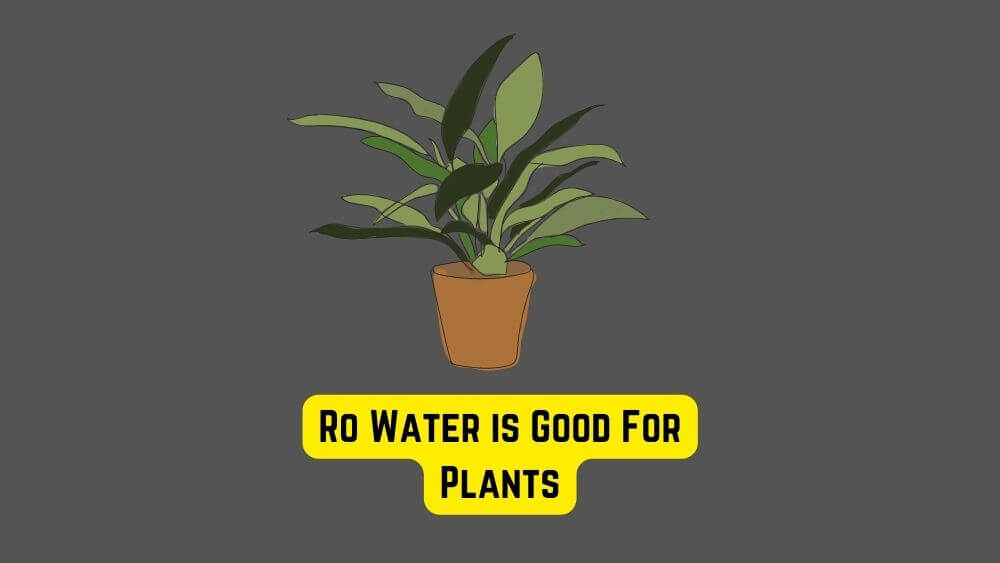Reverse osmosis water is often thought to be purer than regular tap water, but is it better for your plants? The answer is yes. But why? Continue reading for the explanation.
RO water stands for reverse osmosis water. It is made by forcing water through a fine filter to remove impurities. This process removes minerals from the water, making it purer. While RO water removes most contaminants, including dissolved minerals, from the water, it can make it more difficult for plants to absorb the water.
Reverse Osmosis Water Good for Plants
Some gardeners believe that RO water is too pure for plants and can leach nutrients from the soil. They argue that plants need minerals to thrive and that RO water can deprive them of these essential nutrients. However, there is no scientific evidence to support this claim.
Studies have shown that RO water can help improve plant growth! Other gardeners believe that RO water is just fine for plants. They argue that purification removes harmful chemicals and toxins from the water, making it safer for plants to consume. Plus, they say that the lack of minerals in RO water isn’t an issue because most soils already contain plenty of minerals for plants to absorb.
The Fact Exposed
- Which water is best for growing plants?
Rainwater
- Does rainwater have low TDS (Total Dissolved Solid)?
Yes
- Does RO water have low TDS (Total Dissolved Solid) too?
Yes
Is RO water do the same thing as rainwater?
Yes

Do Plants Grow Better With Ro Water?
If you’re looking to give your plants a little boost, using RO water may be the way to go. RO water (or reverse osmosis water) is filtered water with most impurities removed. This makes it ideal for watering plants, as it can help them grow faster and healthier.
One of the main benefits of using RO water for plants is that it helps them absorb nutrients more effectively. This is because RO water has a lower concentration of minerals than regular tap water. As a result, your plants can access the nutrients they need more efficiently, leading to faster growth.
In addition, RO water can also help prevent problems like root rot and mineral build-up in the soil. Root rot is caused by fungi or bacteria that enter plant roots and cause them to decay. Using RO water to water your plants can help keep their roots healthy and free from these harmful organisms.
Similarly, mineral build-up in the soil can lead to problems like stunted growth or yellowing leaves. However, since RO water contains fewer minerals than tap water, it can help prevent this issue from occurring in the first place. Overall, using RO water for your plants is a great way to improve their health and encourage faster growth.
If you’re looking for an easy way to boost your garden, switching to reverse osmosis watering may be just what you need!
Can I Water My Plants With Ro Waste Water?
Yes, you can water your plants with RO (reverse osmosis) wastewater. However, there are a few things to keep in mind. The wastewater of RO is purified in 3 stages; in the 4th stage (RO membrane), the wastewater is filtered out. That means wastewater from the RO system is much purer than tap water.
You can use the wastewater for your plants without any doubt. But, if you want to boost your plants, RO water can be a better solution. This means using wastewater from the RO system is fine and won’t harm your plants.
What Can I Add to RO Water for My Plants?
One of the most important things you can do for your plants is to ensure they get enough water. However, if you are using RO (reverse osmosis) water for your plants, it will be better to add some additional nutrients to ensure they are getting everything they need. Adding these nutrients is optional. Here are a few things you can add to RO water for your plants:
- Nutrient Solution
A nutrient solution contains all the essential nutrients your plants need to grow and thrive. You can purchase a commercial nutrient solution or make your own by mixing together different fertilizers. Be sure to follow the instructions on how much fertilizer to use.
- Calcium
You can add calcium to your water by using a calcium supplement or adding crushed eggshells or limestone chips to your watering can or reservoir.
- Magnesium
Like calcium, magnesium is also an essential mineral for plant growth. Magnesium can add it to RO water like calcium (using a supplement or adding eggshells/limestone).
- Iron
You can add iron to your water by using an iron supplement or by adding rusty nails or other iron objects into your watering can or reservoir. Please make sure these objects are clean before adding them.

What Kind of Water is Best for Plants?
There are a few different types of water used for plants: rainwater, distilled water, tap water, and RO water. Each type of water has its benefits and drawbacks. Rainwater is the most realistic option for watering plants.
It’s free of chemicals and minerals, which can build up in the soil and harm plants. However, rainwater can also contain harmful bacteria or pollutants if collected from an unclean surface like a roof. Rainwater is best used for watering plants sensitive to chemical buildups, such as succulents or cacti.
Distilled water is another option for watering plants. It’s completely free of impurities, including minerals, chemicals, and bacteria. This makes it ideal for watering delicate plants that even trace amounts of contaminants could harm.
However, distilled water is also costly to produce on a large scale. For this reason, it’s not always practical to use distilled water for all your plant-watering needs. Tap water is the most common type of water used to water plants.
It contains small amounts of minerals and other contaminants that aren’t harmful to most plants. Some studies have shown that these impurities can help Plants grow faster by providing them with essential nutrients.
RO water is almost similar to distilled water and rainwater. All of this water is free from contaminants. These three types of water are the most appropriate for plants.
Does Ro Water Kill Plants?
It’s a common misconception that RO water is bad for plants. It can be pretty beneficial! Here’s a closer look at why RO water can be suitable for your plants and how to use it effectively:
We know that RO water is much purer than regular tap water. While most people think pure water is bad for plants because it lacks minerals, the opposite is true. The lack of impurities in RO water means plants can absorb nutrients more efficiently. This can lead to healthier growth and bigger yields!
Add a nutrient solution if you’re using RO water to water your plants. This will give them the minerals they need to thrive. You can also try using pure rainwater or distilled water, which contains no extra nutrients.
Tap Water Vs. Ro Water for Plants
Yes, reverse osmosis water is better for your plants than tap water. RO systems are often used to purify drinking water, but we can also use them to filter water for gardening purposes. One advantage of using RO water for plants is that it can help to prevent harmful mineral buildup in the soil. Over time, minerals in tap water can accumulate in the ground and lead to problems such as poor drainage and unhealthy plant growth.
RO-filtered water can help flush these minerals out of the soil, keeping it healthy and productive. Another benefit of using RO water is that it can improve plant growth by providing a more balanced pH level. This is because most municipal tap waters contain high chlorine levels, which can make the soil too alkaline or acidic over time.
Using RO-filtered water, you can maintain a more consistent pH level in your soil, leading to healthier plant growth. There are a few potential drawbacks to using RO-filtered water for plants.
A potential drawback is that reverse osmosis systems can be expensive to install and maintain. If you’re on a tight budget, you may want to use regular tap water for your plants instead of investing in an RO system.
How to Remove Salt from Softened Water for Plants
If you have softened water for your plants, you may notice that the leaves start to turn brown, and the plant doesn’t seem to be growing as well. This is because there is too much salt in the softened water. You will need to do a simple flush to remove salt from softened water for plants.
Fill up a sink or bucket with fresh water and slowly pour it over the plant, letting it run off the leaves and into the soil. Do this until the water coming out of the drainage holes is clear. You can also use distilled water for this flush, which will help remove any build-up on the leaves.
Is Distilled Water Good for Plants
Distilled water is simply water that has been boiled and then condensed back into its liquid state. This process removes all impurities from the water, including minerals, salts, and other contaminants. So, is distilled water good for plants?
The answer depends on the plant. Most plants prefer distilled water because it contains no minerals that can build up in their soil and cause problems. Other plants are more tolerant of regular tap water and will do fine.
Conclusion
Yes, RO water is suitable for plants. It is because RO water removes impurities from the water that can harm your plants. You can use RO water for your plants without any hesitation.

Hasan Al Sarker is a Reverse Osmosis Specialist. He has worked for many years to ensure safe drinking water for all. His research paper has been published in several journals, including Issue, Medium, and Slideshare. He is recognized as a water doctor among specialists though he did not attend medical college.
Besides working as a researcher of reverse osmosis technology, he is also very fancy with the kitchen and cooking. His guides are reading thousands of people every day. As a head of content, he is responsible for all the published articles at RO System Reviews.

